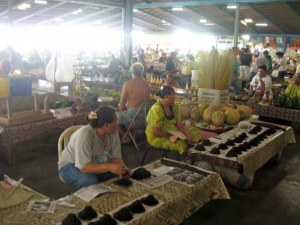
Samoan market
Extensive research has pinpointed “trust” as a critical element for creating healthy relationships and communities. It literally is the thread that weaves our social fabric together. Trust lies at the heart of successful relationships at the individual and community level. Commercial relationships also flourish with trust – enabling cooperation and collaboration in working together solving problems.
On the other hand, a lack of trust undermines relationships and often results in conflict. At an economic level, a lack of trust can often result in inefficiencies and under-performance that reduces productivity levels. It is also likely to add costs through the need for greater surveillance and monitoring, lower morale, and a higher turnover of employees.
The research of Merlina Missimer (2013) identified five separate factors that can serve as guiding design principles to strengthen trust in any community or institutional setting:
- Health and well-being – for individuals both physically and mentally. In an organisation it might refer to working conditions.
- Influence – being able to participate in shaping the social systems one is part of. This can include the right to vote, or be consulted on decisions that affect you.
- Competence – having the opportunity to be good at something, and develop one’s skills to become better. In an organisation it might refer to training and development opportunities. In society generally, it includes access to education and training.
- Impartiality – equal treatment for all; between individuals, between individuals and organisations, and in decision-making institutions – like councils and courts.
- Meaning – having a purpose and reason for being. In an organisation it might refer to clarity of purpose for the company, and for individual roles contributing to that purpose. [1]
Learning journal activity
This activity is required for students seeking formal credit. Other students may complete a learning journal but it will not be assessed.
- Reflecting on what you understand about social sustainability, human needs and the building blocks for increasing trust, note down your answers to these questions:
- Do you think that levels of trust generally are increasing or decreasing as between individuals and business, individuals and government, and between business and government?
- What are the reasons for your thoughts?
- What examples can you point to from your own experience where trust has been undermined or destroyed?
- Which of the principles above do you think are most relevant, and why?
- Think of a governance system you’re familiar with, perhaps a company that you’ve worked with, or your local council, or national government. In what practical ways do you think governance processes could be enhanced to promote greater trust? What would be required, in your view, to achieve those changes?
You must be logged in to post to WEnotes.
- ↑ The Social Dimension of Strategic Sustainable Development; Merlina Missimer (2013) retrieved on 6th November 2014 from http://www.bth.se/fou/forskinfo.nsf/all/30692df535b84f62c1257b390042ed84/$file/Missimer_lic.pdf
Extensive research has pinpointed “trust” as a critical element for creating healthy relationships and communities. It literally is the thread that weaves our social fabric together. Trust lies at the heart of successful relationships at the individual and community level. Commercial relationships also flourish with trust – enabling cooperation and collaboration in working together solving problems.
On the other hand, a lack of trust undermines relationships and often results in conflict. At an economic level, a lack of trust can often result in inefficiencies and under-performance that reduces productivity levels. It is also likely to add costs through the need for greater surveillance and monitoring, lower morale, and a higher turnover of employees.
The research of Merlina Missimer (2013) identified five separate factors that can serve as guiding design principles to strengthen trust in any community or institutional setting:
Learning journal activity
This activity is required for students seeking formal credit. Other students may complete a learning journal but it will not be assessed.
You must be logged in to post to WEnotes.
Content is available under the
Creative Commons Attribution Share Alike License.
Privacy Policy | Authors